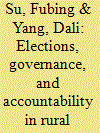|
|
|
Sort Order |
|
|
|
Items / Page
|
|
|
|
|
|
|
| Srl | Item |
| 1 |
ID:
144851


|
|
|
|
|
| Summary/Abstract |
China's rising demand for natural resources and its growing presence in many poor and resource-rich countries have been criticized for promoting neo-colonialism in the 21st century. Using panel data for 135 developing countries from 1995 to 2007, the present paper empirically evaluates the validity of such claims. Our findings do not support the resource curse thesis in the areas of industrialization and economic growth. Moreover, the effect of resources is conditional on the initial quality of political institutions in a country.
|
|
|
|
|
|
|
|
|
|
|
|
|
|
|
|
| 2 |
ID:
071709


|
|
|
|
|
| Publication |
2005.
|
| Summary/Abstract |
While competitive elections are a crucial aspect of village democracy, they are only one means to achieving good governance. In this article, we consider village elections in the broader context of improving governance in China. We argue that the promotion of village democracy should be complemented by simultaneous improvements in a number of other non-electoral areas that enhance the accountability of public officials. The Chinese central government has paid greater attention to these institutional aspects in recent years. The leadership is willing to encourage local experiments and tolerate some unorthodox practices. This interaction between local initiatives and central interventions will shape the future of village democracy in rural China. We analyze several of them in particular: tax-for-fee reform, new accounting practices, village affairs disclosure, and institutionalized participation in democratic decision making. This article reveals great diversity and discusses the politics of these institutional changes.
|
|
|
|
|
|
|
|
|
|
|
|
|
|
|
|
| 3 |
ID:
113690


|
|
|
|
|
| Publication |
2012.
|
| Summary/Abstract |
To explain China's dramatic economic growth, researchers have proposed a "tournament thesis." According to this thesis, the central government's ability to set growth targets has played a crucial role in growth since political promotion is largely based on local economic growth. We use provincial officials' career mobility data to test this thesis. For both time periods (1979-1995 and 1979-2002), economic performance, measured in annual, average and relative terms, did not affect these officials' career advancement. We then sketch an alternative analytical framework to explain Chinese local officials' strong urge for developmentalism and, finally, draw policy implications from this explanatory framework.
|
|
|
|
|
|
|
|
|
|
|
|
|
|
|
|
| 4 |
ID:
110259


|
|
|
|
|
| Publication |
2012.
|
| Summary/Abstract |
China's fiscal arrangement in the 1980s has preserved local governments' incentive but the 1994 fiscal reform recentralized revenues. Since then, farmers' tax burdens have risen steeply and become a major challenge to the state legitimacy. How to account for the huge regional variation? Why were some localities able to tax more heavily than others? Based on a national survey of village governance in China, we examine farmers' burdens empirically and identify political and social factors that explain the local governments' ability to tax farmers. This paper suggests that developments since the 1990s have shown that it overstates local discretionary power and does not pay enough attention to societal forces in understanding local public finance.
|
|
|
|
|
|
|
|
|
|
|
|
|
|
|
|
|
|
|
|
|